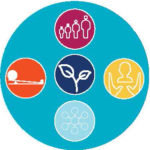Donor funds, when supporting the right efforts, can transform people’s lives and communities. The issues we focus on in this year’s High Impact Giving Guide are among the most challenging facing society, but the programs and organizations we profile demonstrate daily that positive impact can be created. More nonprofits making an impact on mental health and addiction

Nurse-Family Partnership
What It Does
Prolonged “toxic stress”—the type caused by homelessness, hunger, neglect, or exposure to violence—can negatively affect a child’s social, emotional, and cognitive development. Nurse-Family Partnership (NFP) is a community program that reduces the impact of toxic stress by supporting parents and improving access to services that ensure better health for the entire family.
NFP pairs specially trained registered nurses with vulnerable women who are pregnant with their first child, starting early in pregnancy and continuing through the child’s second birthday. During free at-home visits, mothers get support and guidance to help them care for their child. They also develop skills that help them reach education and employment goals. Nurses are trained to monitor and respond to symptoms of postpartum depression and postpartum psychosis/schizoaffective disorder. NFP also provides wraparound care, referring women to social services, legal counsel, and group community outings.
NFP’s new app, Goal Mama, helps women and their NFP nurse stay connected in between visits, enabling greater flexibility and engagement.
NFP chapters are increasingly targeting their outreach efforts toward low-income or traditionally hard-to-reach moms, including those with medically complicated pregnancies, women experiencing homelessness, and women experiencing substance use disorders, including opioid use disorder and neonatal abstinence syndrome.
How Effective It Is
NFP’s nurse-home visitation program has been subject to rigorous studies that show a lasting impact on the over 300,000 families that have been served since 1996. Children and mothers paired with an NFP nurse see incidences of child abuse and neglect, emergency room visits due to accidents and poisonings, and arrests—all of which are traumatic experiences for children—cut in half. A reduction in these traumatic events results in lessened levels of toxic stress and adverse childhood experiences, resulting in better mental health outcomes. Children of mothers paired with an NFP nurse also show stronger developmental outcomes, with reductions in language delays and intellectual problems.
The Washington State Institute for Public Policy found a net benefit to society of $60,000 per family served (the average cost of the program per family is $9,500), with the bulk of the savings from increased tax revenues and reductions in expenses related to crime, welfare, and other social costs. That’s a return of more than $6 for every $1 spent.
How You Can Help
Nationwide, NFP receives nearly 80% of its total funding from foundations and individual donors. A $100 donation can help connect a new family to NFP’s program; $500 can help support NFP nationally; and $100,000 helps educate a team of nurses to implement the NFP model in a new community, contributing to NFP’s goal of scaling up to serve 100,000 clients per year by 2023. You can locate current NFP programs (and those of their partners—their model is implemented in seven other countries through different independent organizations) on the organization’s Nurse Family Partnership website.
More Ways to Help — To find other home visitation and outreach programs in your area to support, see the Health Resources and Services Administration’s Maternal, Infant, and Early Childhood Home Visiting Program or contact your local community health center or public health department.
